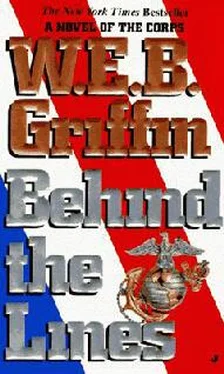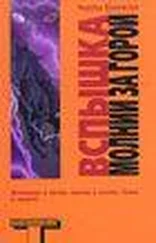W.E.B. Griffin - The Corps VII - Behind the Lines
Здесь есть возможность читать онлайн «W.E.B. Griffin - The Corps VII - Behind the Lines» весь текст электронной книги совершенно бесплатно (целиком полную версию без сокращений). В некоторых случаях можно слушать аудио, скачать через торрент в формате fb2 и присутствует краткое содержание. Жанр: prose_military, на английском языке. Описание произведения, (предисловие) а так же отзывы посетителей доступны на портале библиотеки ЛибКат.
- Название:The Corps VII - Behind the Lines
- Автор:
- Жанр:
- Год:неизвестен
- ISBN:нет данных
- Рейтинг книги:3 / 5. Голосов: 1
-
Избранное:Добавить в избранное
- Отзывы:
-
Ваша оценка:
- 60
- 1
- 2
- 3
- 4
- 5
The Corps VII - Behind the Lines: краткое содержание, описание и аннотация
Предлагаем к чтению аннотацию, описание, краткое содержание или предисловие (зависит от того, что написал сам автор книги «The Corps VII - Behind the Lines»). Если вы не нашли необходимую информацию о книге — напишите в комментариях, мы постараемся отыскать её.
The Corps VII - Behind the Lines — читать онлайн бесплатно полную книгу (весь текст) целиком
Ниже представлен текст книги, разбитый по страницам. Система сохранения места последней прочитанной страницы, позволяет с удобством читать онлайн бесплатно книгу «The Corps VII - Behind the Lines», без необходимости каждый раз заново искать на чём Вы остановились. Поставьте закладку, и сможете в любой момент перейти на страницу, на которой закончили чтение.
Интервал:
Закладка:
The information gathered was presented to the Commanding General, USFIP, and various aspects of the operation were discussed with him and offi-cers of his staff.
General Fertig suggested that the Buick was probably the property of the Dole Company, which had provided such a vehicle for the general manager of their pineapple plantation.
"Interesting machine," General Fertig observed. "Not only was it clutch-less-they called it 'Automatic Drive,' or something like that; all you had to do to make it go was step on the gas-but it had a little lever, which when flicked flashed lights on the top of the front fenders and in the middle of the trunk, showing the direction you intended to turn. I'm seriously considering getting one after the war."
The pros and cons of an operation against the Japanese convoy were dis-cussed at some length.
Captain John B. Platten, USFIP (formerly Master Sergeant, 17th Philip-pine Scouts) G-4 (Supply) Officer, stated that while the trucks very likely would contain bags of rice, and possibly other transportable rations, from what he had heard from Captain Weston, the gasoline and kerosene were in fifty-five-gallon drums. Moving them any distance would be difficult. He also pointed out that even with strict fire discipline, any attack would dangerously diminish the very limited stocks of.30 and.45 caliber ammunition available to USFIP, and that it was probable that the Japanese soldiers guarding the convoy possessed limited (no more than, say, twenty or thirty rounds per man) of am-munition for their 6.5mm Arisaka rifles, much of which, it had to be antici-pated, would be expended during the attack.
"We're liable to wind up with less ammo and weapons after we hit the convoy than we have now, even counting the weapons we take from the Japs. And the six-point-five is a lousy round, anyway."
"In other words, it is your studied opinion, Captain," General Fertig asked, "that, so to speak, an attack on this convoy would be wasted effort?"
"No, Sir," Captain Platten said quickly. "I mentioned these things so we could plan for them."
"Such as?"
"I suggest, Sir, that we form a group of people whose sole mission it will be to carry the portable supplies-the rice, canned goods, whatever-back here as soon as we lay our hands on them."
"And the nonportable? The gas and kerosene?"
"I suggest, Sir, that we gather together whatever we can lay our hands on that will hold liquid-canteens, water bottles, whatever-and have people to fill them and carry what they can back here with the rations. What we can't bring back, we bury in the jungle, and maybe go back for it later."
"And the question of having less weaponry subsequent to the attack than we have now? How do we deal with that?"
"Permission to speak, Sir?"
"Certainly, Lieutenant Everly."
"That Arisaka's not a Springfield, I'll grant you that. But it's more reliable than the Enfields-their extractor is always busting-which is what we mostly have. And the Filipinos can handle the recoil from an Arisaka better than they can from a.30-06. And we know we're not going to get any more.30-06 ammo anytime soon."
That was a reference, which everyone understood but no one commented upon, to the silence of Headquarters, South West Pacific Ocean Area, in re-sponse to repeated USFIP radio requests for the supply of small arms and am-munition.
"Your point, Lieutenant Everly?" General Fertig asked with either a hint of reproach or impatience in his voice.
"I think we have to kill the Japs before they have a chance to shoot off much of their ammo," Everly said. "Even if that means shooting up the U.S. ammo we have."
"And how do we do that?"
"First, we stop the convoy by shooting the driver of the Buick. Then, when the trucks are stopped, we kill the soldiers in the backs of them. And finally, we kill the truck drivers and whoever is left over. Every rifleman has a target, and we tell him he don't shoot anybody else until his target is down."
"I was about to suggest we try to find marksmen," Fertig said, "but I think if we put the question to the troops, every one of them will swear, as a matter of masculine pride, that he is Dead-Eye Dick."
"Yes, Sir, they will," Everly agreed. "The only thing to do is test them."
"We don't have enough ammo," Captain Platten argued.
"We give them a two-shot test. A head-size target, a pineapple, at one hundred yards. If they can hit a pineapple at a hundred yards, they can hit a Jap in the chest at twenty."
"Who will... take out... the driver of the staff car?" General Fertig asked.
"I will," Everly said.
"I always got my three bucks," Captain Platten said. "I'll take out the driver of the pickup. That way he won't be able to turn around and run."
"Excuse me?" General Fertig asked. "What was that you said, 'three bucks'?"
"My Expert Rifleman's pay, Sir," Captain Platten said.
"We seem to be getting ahead of the primary question," General Fertig said. "Which is, should USFIP attack the Bislig-Caraga convoy?"
"I don't think we have any choice, Sir-" Captain Hedges began.
"Excuse me, Captain," Fertig interrupted him. "I believe the hoary tradi-tion is that when the commanding officer solicits opinions, the junior of his officers respond first. That way, the juniors are not influenced by the opinions of their superiors."
"Excuse me, Sir," the Chief of Staff of USFIP said.
"Lieutenant Everly?"
"Yes, Sir. The sooner the better."
"Captain Platten?"
"Yes, Sir. Like Everly says."
"Captain Buchanan?"
"Yes, Sir."
"Captain Weston?"
"Yes, Sir."
"Captain Hedges?"
"Yes, Sir. I don't think we have any choice, General. We need the rice and whatever else is edible. We need both gas and kerosene. And the Jap weapons. And it will let the Japs know we're here!"
"Yeah," Everly said, with an intensity that surprised Weston.
Then Weston had a second thought: Well, now I know where I stand in the pecking order. Ahead of Buchanan and behind Hedges.
There seemed to be immediate confirmation of this.
"In that case, gentlemen," Fertig said. "We will attack the convoy at our earliest opportunity. Captain Weston will lead the attack."
"I'd like to lead it, Sir," Captain Hedges said.
"You're too valuable around here, Hedges," Fertig said.
"With respect, Sir," Captain Platten said. "I've got more experience in infantry. Nothing personal, Weston."
"I'll tell you this once, Platten," Fertig said. "I considered that, among other factors, before I made my decision. Never again question my orders."
Platten's face tightened, but after a moment he said, "Yes, Sir. Sorry, Sir."
As finally formed, the attack party consisted of the detail commander (Captain Weston) armed with a Thompson.45 caliber submachine gun; three officers (Captain Platten, and Lieutenants Everly and Alvarez) armed with Springfield 1903.30-06 rifles; and nine enlisted men (two American) armed with Enfield Model 1917.30-06 rifles.
They were accompanied by a twenty-five-man labor detail under Lieutenant Jose Lomero, late of the 17th Philippine Scouts. Lieutenant Lomero was armed with a.45 ACP Model 1911A1 pistol and an Enfield rifle. Two of his sergeants were armed with the Enfield. The balance of his detail was either unarmed or armed only with machetes. They carried with them the only shovel available to USFIP, and a motley collection of canteens, water bottles, and other vessels, including two small wooden barrels.
The attack party left Headquarters, USFIP, at first light Monday 19 Octo-ber with the labor detail sandwiched between the armed men. After an eight-hour march through the mountainous jungle, a bivouac was established at what was estimated to be a mile from the ambush site.
A detail under Captain Weston, consisting of Lieutenant Everly, four armed members of the party, and three members of the labor detail, then pro-ceeded to the attack site. Captain Platten remained at the bivouac site to super-vise the construction of crude lean-tos and to establish a perimeter guard.
Читать дальшеИнтервал:
Закладка:
Похожие книги на «The Corps VII - Behind the Lines»
Представляем Вашему вниманию похожие книги на «The Corps VII - Behind the Lines» списком для выбора. Мы отобрали схожую по названию и смыслу литературу в надежде предоставить читателям больше вариантов отыскать новые, интересные, ещё непрочитанные произведения.
Обсуждение, отзывы о книге «The Corps VII - Behind the Lines» и просто собственные мнения читателей. Оставьте ваши комментарии, напишите, что Вы думаете о произведении, его смысле или главных героях. Укажите что конкретно понравилось, а что нет, и почему Вы так считаете.










